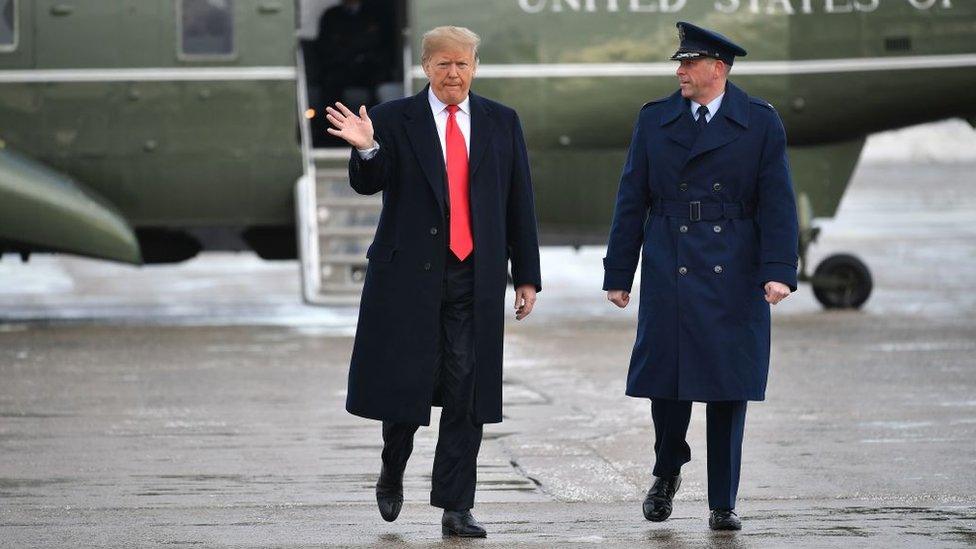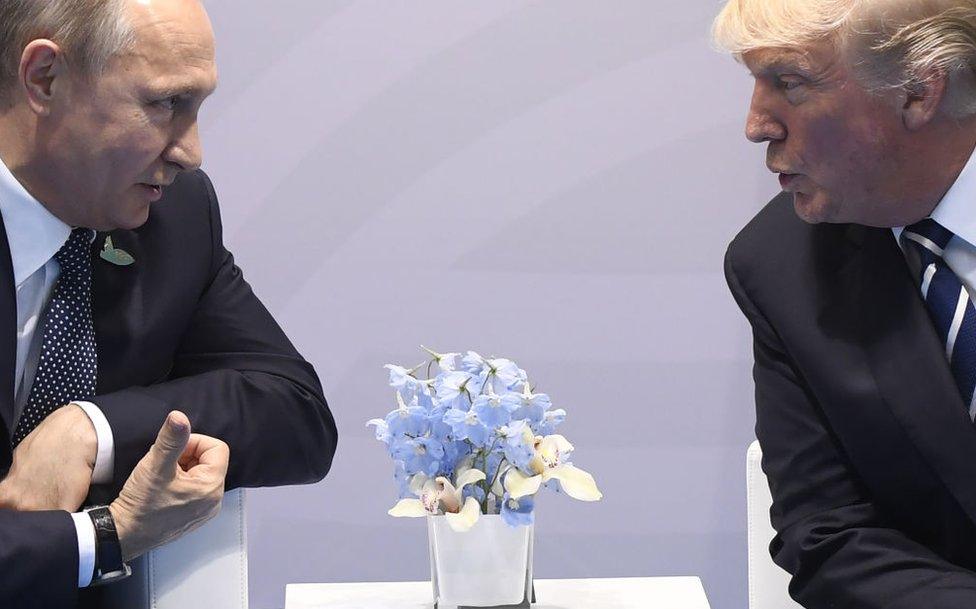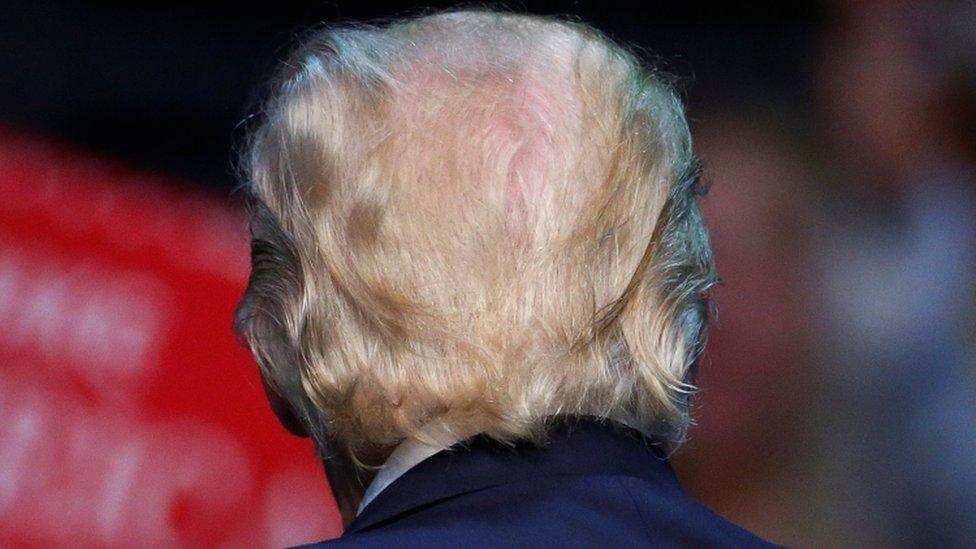Trump denies he ever worked for Russia
- Published

US President Donald Trump has denied working for Russia, pouring scorn on the latest reports to cast scrutiny on his relationship with Moscow.
Addressing reporters at the White House as he left for Louisiana, he said: "I never worked for Russia."
He played down a Washington Post report that he had concealed a translation of a meeting with Mr Putin.
According to the New York Times meanwhile, the FBI launched a hitherto unreported inquiry into the president.
What was the FBI inquiry?
According to the newspaper, the FBI's suspicions were raised after Mr Trump fired its director, James Comey, in May 2017.
That FBI inquiry, reports the New York Times, was taken over by justice department special counsel Robert Mueller.
Mr Mueller is leading an ongoing investigation into whether the Trump campaign colluded with the Kremlin to influence the 2016 presidential election.
Asked outside the White House on Monday if he was working for Russia, Mr Trump denied it outright before adding: "I think it's a disgrace that you even ask that question because it's a whole big fat hoax."

The two leaders had a private conversation during the 2017 G20 summit in Hamburg
The Republican president was posed the same question by a Fox News host on Saturday, and called it "the most insulting thing I've ever been asked".
The New York Times notes in its own report no evidence has emerged publicly that Mr Trump took direction from Russian government officials.
On Monday, the president said his dismissal of Mr Comey was "a great service I did for our country", while railing against FBI investigators as "known scoundrels" and "dirty cops".
What of the Putin meeting?
It was also reported at the weekend that Mr Trump had confiscated the notes of his own interpreter after a meeting with Russian President Vladimir Putin.
According to the Washington Post, the US president ordered the translator not to discuss the details of what was said.
But on Monday, Mr Trump defended his nearly hour long discussion with Mr Putin in July 2017 on the sidelines of a G20 summit in Hamburg, Germany.
"It's a lot of fake news," said Mr Trump, as he left to address a farming convention in New Orleans. "That was a very good meeting. It was actually a very successful meeting."
He said he and Mr Putin discussed Israel and a German-Russian pipeline, adding: "We have those meetings all the time no big deal."
ABC News reports that Democratic congressmen are considering issuing subpoenas to interpreters who attended Mr Trump's meetings with Mr Putin.
On Monday, former Democratic White House candidate Hillary Clinton could not resist reminding Twitter users that during a campaign debate she had called Mr Trump the Russian leader's puppet.
Allow X content?
This article contains content provided by X. We ask for your permission before anything is loaded, as they may be using cookies and other technologies. You may want to read X’s cookie policy, external and privacy policy, external before accepting. To view this content choose ‘accept and continue’.


More battles to come
Analysis by Anthony Zurcher, BBC Washington
A sitting US president has never been publicly asked if he is - knowingly or unwittingly - a Russian agent. Until now.
For Donald Trump's critics, this is but one more indication of the uncharted territory the US is in, as the nearly two-year-long investigation into possible ties between the Trump presidential campaign and Russia grinds along.
For Mr Trump's defenders - and the president himself - it is only the latest indignity the man has been subjected to by enemies intent on undermining his administration and discrediting his electoral victory. On Monday he called questions about his Russia ties a "disgrace"
Those questions aren't going away, however. Stories like the one in the Washington Post this weekend outlining efforts the president made to conceal information about his meetings with Russian President Vladimir Putin will only stoke the flames of interest.
Rumours abound that Robert Mueller's special counsel team could issue a final report as soon as next month. It may set out the case against the president and his team or offer them vindication.
Until then, it's all a scramble to gain the high ground for the coming battles.

What else are Democrats investigating?
Having taken over the House of Representatives this month, the Democrats are flexing their political muscles.
Lawmakers have invited Mr Trump's former lawyer Michael Cohen to testify before a congressional committee next month, and have warned the president not to interfere.
In a joint statement, congressmen Elijah Cummings, Adam Schiff and Jerrold Nadler said Mr Trump must not try to "discourage, intimidate or otherwise pressure" his former personal fixer.
In December, Mr Cohen admitted arranging hush money payments to Mr Trump's alleged lovers, blaming his former boss for leading him to "choose the path of darkness".
He has agreed to appear publicly before the House Oversight Committee on 7 February.

You may also be interested in:

What's the latest with Mueller inquiry?
Mr Trump's nominee for US attorney general, William Barr - who would have oversight of the Mueller inquiry if approved - faces a confirmation hearing on Tuesday.
According to prepared testimony, William Barr will pledge to protect the special counsel's investigation, and let the public know about the probe's findings.
"I believe it is vitally important that the Special Counsel be allowed to complete his investigation," Mr Barr is expected to say.
But the former attorney general under President George HW Bush is likely to face a grilling from Democrats.
They are likely to ask why he wrote in a legal memo last June that Mr Mueller's inquiry was "fatally misconceived".


- Published14 January 2019
